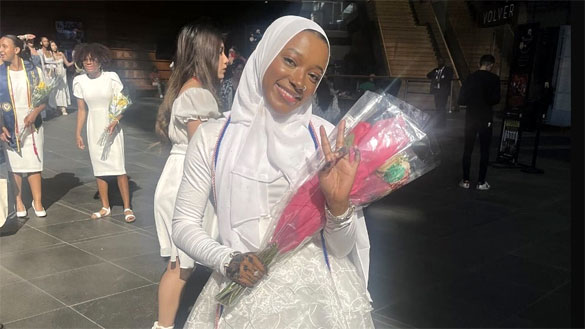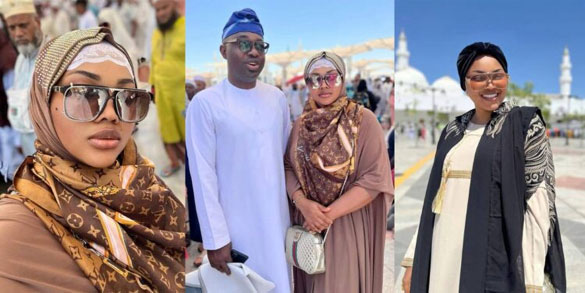Philadelphia Muslim High School Graduate, Hafsah Abdur-Rahman, Denied Diploma After Doing ‘The Griddy’ Dance On Stage
18 June 2023
• Philadelphia Muslim High School Graduate, Hafsah
Abdur-Rahman, Denied Diploma After Doing ‘The Griddy’ Dance On Stage
•
Actress Mercy Aigbe Embarks On Spiritual Journey To Mecca Following Conversion
To Islam
•
How India Is Empowering Women And Promoting Their Leadership
•
Executed Women Haunt, Inspire Iranian Bahais 40 Years On
Compiled by New
Age Islam News Bureau
URL: https://newageislam.com/islam-women-feminism/philadelphia-muslim-hafsah-griddy/d/130020
-----
Philadelphia
Muslim High School Graduate, Hafsah Abdur-Rahman, Denied Diploma After Doing
‘The Griddy’ Dance On Stage

Courtesy of Renée Hadiyah Reid
------
COURTNEYB
JUNE
17, 2023
A
Philadelphia Muslim high school graduate was left embarrassed after she was
denied her diploma during the graduation ceremony for dancing on stage.
Hafsah
Abdur-Rahman, 17, is calling for change after she was denied her diploma from
The Philadelphia High School for Girls for doing a dance known as “The Griddy”
during the June 9 ceremony.
According
to ABC 6, a viral video shows the teen
getting called to accept her diploma and dancing over to the faculty member
holding the document.
“I
understood the rules because I was saying ‘shh’ in the video. Do not say
nothing because I want my diploma,” said Abdur-Rahman. “I knew and understood
what we were supposed to do.”
“If
they thought that I shouldn’t do ‘The Griddy’ across the stage and do the Girls’
High traditions, nobody should have been able to wave or blow kisses or do
period signs because I feel like that’s the same thing, she said. “I feel like
that’s unfair.”
Source:
The Source
Please
click the following URL to read the full text of the original story:
-----
Actress
Mercy Aigbe embarks on spiritual journey to Mecca following conversion to Islam

Nollywood actress Mercy Aigbe
------
by
Esther Ordia
June
17, 2023
Nollywood
actress Mercy Aigbe, accompanied by her husband Kazim Adeoti, has embarked on a
spiritual journey to Mecca after recently announcing her conversion to Islam.
Taking
to Instagram, Mercy shared the news of their departure, expressing her
gratitude and captioning the post with “Hajj 2023…… Alhamdulilah.”
Capturing
the solemn moment at the airport, Mercy looked stunning in a beautiful black
dress, while her husband, KazimAdeoti, wore a white Jalabiya and a traditional
cap.
Source:
Olorisupergal
Please
click the following URL to read the full text of the original story:
Source:
OloriSupergal
-----
How
India is empowering women and promoting their leadership
By
Amitabh Kant
June
18, 2023
India’s
G20 presidency highlights the critical theme of gender equality and the
empowerment of women in domestic and global contexts. Recognising the significance
of women’s education, financial inclusion, and equal opportunities, India aims
to build a robust and inclusive digital public infrastructure (DPI) to advance
women’s economic empowerment. Through various initiatives and innovative
approaches, the government seeks to bridge the gender gap, create sustainable
finance options, and promote women’s leadership at all levels of
decision-making.
A
crucial aspect for the advancement and empowerment of women is ensuring their
financial inclusion. Globally, almost half (42 per cent) of women and girls
remain outside the formal financial system, with a persistent 7 per cent gender
gap. However, India has made remarkable progress in this area. Today, nearly 81
per cent of urban women and 77.4 per cent of rural women in India own a bank
account, which they operate themselves.
To
foster sustainable development through gender equality and women empowerment,
it is imperative to enhance women’s capacities and provide equal opportunities.
Education plays a vital role in this regard, yet gender parity remains a
challenge. Women, still, account for almost two-thirds of all adults unable to
read, and with 54 per cent of the total 78.2 million out-of-school children
being girls, a concerted and coordinated effort will be required to move the
needle. India is committed to making progress in this area. In tandem, the
pervasive issue of malnutrition and food insecurity must be addressed at its
roots. During my tenure as CEO of NITI Aayog, I had the fortune of driving the
GoI’s Aspirational Districts Programme (ADP)—the world’s largest outcome-based
governance project, focused on improving the socio-economic indicators of the
112 most backward districts of India. I saw the impact of combining the
strengths of local governance structures with multi-stakeholder partnerships
first-hand. By setting up model anganwadicentres, standardising data-collection
methods, and creating an enabling environment for innovative solutions, we were
able to improve markers for health, well-being, and overall development
significantly. For example, in Ranchi, Jharkhand, a remarkable initiative
called the Poshan app revolutionised the way malnourishment was addressed in
the district. This app utilised real-time data analytics to monitor crucial
aspects such as bed occupancy, child-growth charts, and inventory levels at
malnourishment treatment centres. The impact was astounding, with bed occupancy
levels at health care centres witnessing an increase of over 90 per cent.
By
bridging the gap in access to digital technologies, promoting women’s
education, and ensuring their health and livelihood, we can accelerate their
economic empowerment globally. Global leaders must collaborate to dismantle
long-term structural barriers that hinder women’s progress across these
critical pillars. The increasing participation of women in any economy not only
fosters growth but also has a positive impact on the overall socio-economic
development of the nation. I firmly believe that women’s empowerment is not
just a cause, but a transformative force that can drive sustainable development
and inclusive growth.
India
recognises the importance of women’s representation at all levels, from
administrative offices to grassroots institutions. By bringing women’s unique
perspectives and experiences to the table, we cultivate more inclusive and
effective decision-making. The sustainability of outcomes and progress towards
gender equality rely on the availability of quality gender-disaggregated data.
By investing in data collection and sharing, and converting it into digital
intelligence, we can develop targeted interventions and monitor the impact of
our efforts.
Advancing
gender equality is essential for creating a more equitable and inclusive
society. By focusing on women’s financial inclusion, strengthening their
capacities, enabling their leadership, and prioritising their health, and the
collection of gender-disaggregated data, we can create a better future. By
building a robust digital public infrastructure and implementing initiatives
that bridge the gender gap, India aims to empower women and promote their
leadership at all levels. It is through these concerted efforts that we can
create a more prosperous future, where women’s economic empowerment and gender
equality are at the forefront of our collective endeavours.
Source:
The Week
-----
Executed
women haunt, inspire Iranian Bahais 40 years on
Jun
18, 2023
PARIS:
One by one, the 10 women, mostly aged under 30, went defiantly to their deaths
by hanging in a city square in Shiraz in southern Iran. The youngest was only
17 years old.
They
had been charged with crimes including espionage but, for supporters around the
world, they were simply being hanged because they were Bahais, and refused to
renounce their faith even under pain of death.
On
Sunday, Iranian Bahais marked 40 years since the June 18, 1983 executions of
the 10 Bahai women in Shiraz, seen as one of the most egregious abuses
committed against the non-Muslim minority that has been persecuted ever since
the Islamic revolution of 1979.
Their
deaths continue to horrify Bahais but also inspire the community as it still
struggles against discrimination in daily life in Iran. Bahais hope all Iranian
women can draw strength from them after a wave of women-led protests shook the clerical
leadership late last year.
"The
arduous path to gender equality in Iran has been walked by countless women over
the decades. That road has been marked by the sacrifices of those who chose to
stand for their principles even over their lives," said SiminFahandej, the
Bahai International Community (BIC) representative to the United Nations in
Geneva.
The
women had been arrested in October and November 1982, tortured, denied the
right to a lawyer and had been offered the opportunity to save their lives by
converting to Islam, according to the BIC.
They
refused to sign the statements that were prepared for them and were taken on
June 18, 1983 from their prison to Chowgan Square in Shiraz where they were
hanged one by one in front of each other.
Two
days earlier, six Bahai men were executed in the same square, some of them
relatives of the 10 women. In all, more than 200 Bahais were executed in the
frenzy of hangings that followed the revolution, according to the BIC.
"There
is tremendous pride in the faith and selfless courage of the 10 women and their
strength in the face of extreme physical and psychological pressure,"
Anthony Vance, director of the US Bahai Office of Public Affairs, told AFP.
SoosanSabet,
the second cousin of one of the women executed, Akhtar Sabet, who was hanged
aged just 25, said she had "good memories" of her relative, a
"pure, kind, friendly and sociable person" who worked as a nurse.
"Even
in prison, she started serving the elderly and sick people. She would prepare
their breakfast, provide medical treatment and wash their clothes," Sabet
told AFP.
"During
the interrogation, she was asked repeatedly to recant her faith and convert to
Islam in order to be released from prison." Akhtar Sabet refused and was
hanged.
RuhiJahanpour,
who was initially held with the women, freed, evaded re-arrest and escaped
abroad, described the women as "really ordinary individuals who loved
their families, loved continuing their education and loved to live their
lives".
But
she was not surprised by their decision not to renounce their faith. "When
they were confronted with this choice... they were willing to give up their
lives. Their life was their faith and their faith was their life."
Commemorating
the anniversary is particularly important for the Bahais at a time when they
say those remaining in Iran are facing a new wave of repression.
The
Bahai faith is not recognised by the Iranian authorities, unlike other minority
faiths including Christianity, Judaism and Zoroastrianism, even though the
community remains the biggest non-Muslim minority in the country.
The
Bahai faith is a relatively modern monotheistic religion with spiritual roots
dating back to the early 19th century in Iran, promoting the unity of all
people and equality.
Iran
brands Bahais "heretics" and often accuses them of being agents of
arch-foe Israel, as their world headquarters are in the Israeli port city of
Haifa.
But
the community rubbishes such suggestions, saying Haifa emerged as a centre of
the faith well before the state of Israel was established in 1948.
Bahais
in Iran complain of official discrimination in their daily lives, making it a
struggle to open businesses and even bury their dead, and they are also
systematically denied access to higher education in Iran.
MahvashSabet
and FaribaKamalabadi, former members of a long disbanded, informal leadership
group of the Bahais of Iran, who had previously each served 10-year sentences
from 2008 to 2018, were re-arrested and sentenced to another 10 years in
prison.
Source:
Times Of India
-----
URL: https://newageislam.com/islam-women-feminism/philadelphia-muslim-hafsah-griddy/d/130020
